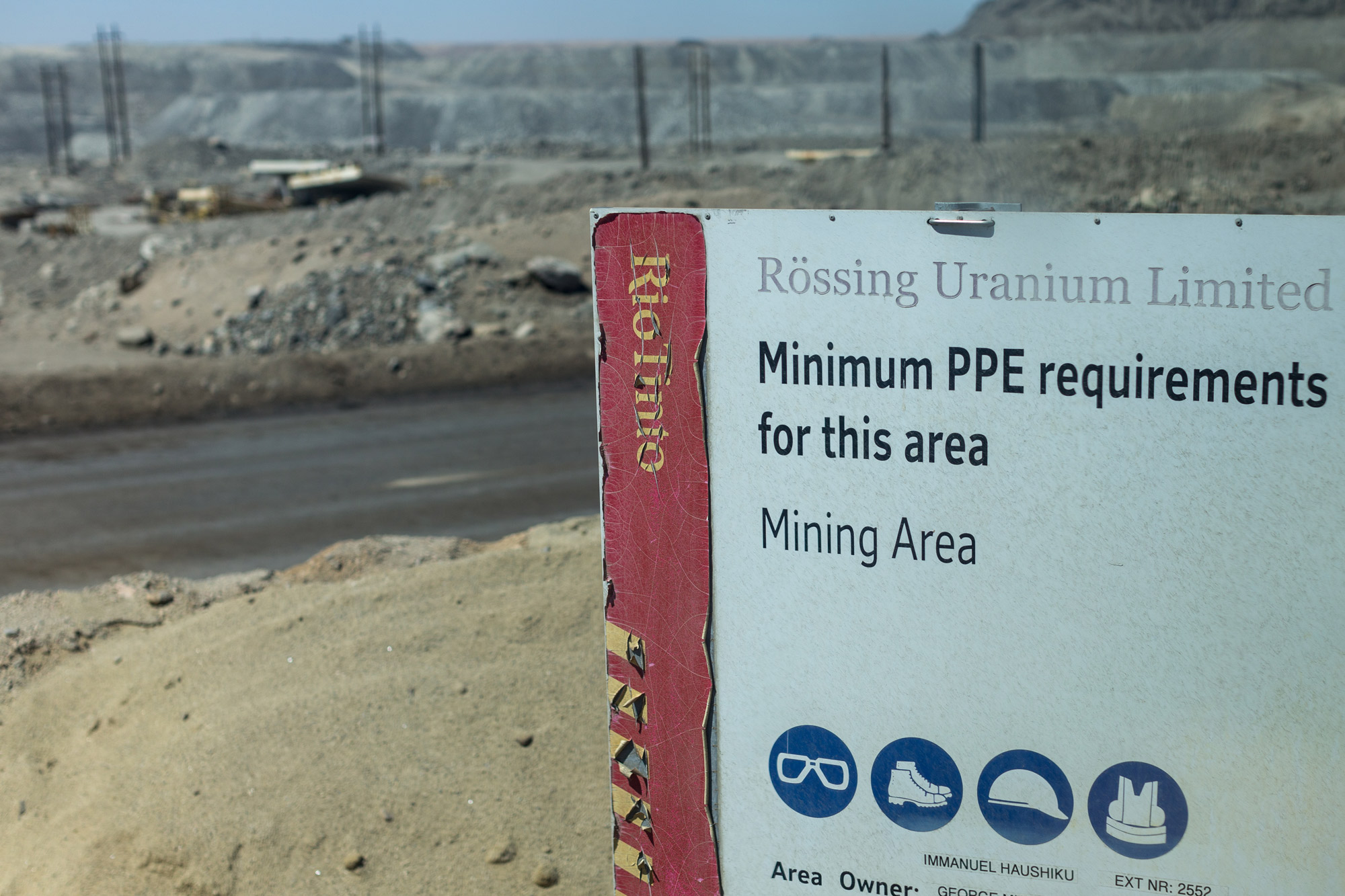New mine owners trample on Namibian workers’ rights
A state-owned enterprise from China bought a huge stake in the Rössing Uranium Mine and immediately began downgrading working conditions before dismissing union leaders.
Author:
15 April 2021

A bitter dispute between the Mineworkers Union of Namibia (MUN) and China National Nuclear Corporation Rössing Uranium Limited (CNNC RUL) is heading to arbitration in Swakopmund from 19 to 21 April 2021.
CNNC RUL, which bought a 68.62% stake in the Rössing Uranium Mine from Anglo-Australian mining giant Rio Tinto Zinc in July 2019, has been heavily criticised for how it runs the mine – including its unfair labour practices.
Rössing is one of the largest uranium mines in the world, and the MUN has spent decades negotiating excellent collective agreements and policies for its 780 members, says Johannes Hamutenya, the union’s Rössing branch chairperson.
Hamutenya worked for the mine for 14 years before he was fired in August 2020, along with eight other members of the MUN Rössing branch executive committee: Julius Ashipala, Albertos Alexander Hennes Haraseb, George Martin, Samuel Shindume, Fillemon Ihuhwa, Paulus Shikongo, Hafeni Nalusha and Ruben Snydewel.
Hamutenya says the union was concerned when it heard CNNC RUL wanted to buy into the mine because the company had no experience in dealing with independent trade unions, which are not permitted in China.
Related article:
Namibia’s mine and energy minister Tom Alweendo told Reuters in 2019: “We have no objection to the sale provided that the buyer abides by what’s expected of him by our laws.” But Hamutenya says within months of taking ownership, CNNC RUL was circumventing the law.
Namibia’s Labour Act says it is an unfair labour practice to unilaterally alter any term or condition of employment. But the new owners insisted on changing MUN’s recognition agreement with the Rössing Uranium Mine, which has been in place for 33 years, Hamutenya says. CNNC RUL also asked to renegotiate the recruitment policy; to remove the union’s offices, archives and boardrooms at the mine; to do away with safety officers and affirmative action monitors; to renegotiate the performance and conduct procedure as well as the disciplinary code; to reduce annual and sick leave days; and to rewrite the retrenchment policy.
“The retrenchment policy is the best in Namibia. The Chinese and Namibian management wanted all these documents renegotiated so that they could have more power to do what they want,” says Hamutenya. The new managers also wanted to do away with pay scales. “They wanted to breach the Affirmative Action Act by paying employees as they see fit, whereas it says jobs of equal value must be compensated equally. Eventually they said they won’t give us a salary increase if we refuse to renegotiate. They threatened to nullify all the collective agreements, which is unlawful.”
Related article:
He says CNNC RUL then lobbied the national leaders of the mineworkers union to “discipline” the Rössing branch. The dispute eventually came to a head in August 2020 when the committee told their lawyers that four managers had been hired from China without the correct visas. There was an exchange of letters between the union and CNNC RUL’s lawyers, which was covered by the media. Police then arrested the managers, who were released later that night and allegedly left the country.
After that, the nine branch executive committee members were charged with gross negligence, bringing the company into disrepute and breach of confidentiality. They were fired.
Unfairly dismissed and unable to find work
The union leaders say their dismissals have destroyed the lives of their 102 dependents.
“I have been applying for several vacancies but, despite my experience, I have not even got a single call. Our names seem to have been put on a list, and it will be hard for us to find good employment in the country,” says Ashipala, who was the MUN branch secretary for information and publicity, and worked for the mine for nine years.
Vice-chairperson Haraseb, who worked for Rössing mine for over 16 years, says, “I did not plan for early retirement and my retirement funds were very low. I just bought a house five years ago, and I still have 15 years to pay it off. We are struggling to make ends meet, and it is very hard on us.”
Shikongo was the vice-treasurer of the MUN Rössing branch. “I worked for the company for the past 14 years without any record of misconduct on my name until this,” he says. “It is really discouraging as my work helped the company. Labour law allows unions and labour relations to exist. But now my future plans are crippled. My children are four and seven years old, and I worry every day how to provide for those little ones. It is a career massacre that was committed on us because we now cannot get employment after being dismissed.”
Related article:
Snydewel has worked at Rössing mine for more than nine years but was a full-time shop steward for MUN for only 10 months when he was dismissed. “My wife is working but it doesn’t cover our expenses. I have to take care of seven family members. There is a ripple effect as I had to let my helper go and she has a family of her own. I am in debt on my bond repayment,” says Snydewel.
The secretary of the branch, Martin, worked for 13 years at Rössing mine. “Our kids go to school every day. We have to pay for school. We have to pay for food. Namibia has an unemployment rate of between 30% and 50%, and the Covid-19 pandemic has hit the job market. It has hit us very badly. My wife is stressing. She is not sleeping. I was just doing my job for the union. It is not even that I was fired fairly. We were all unlawfully dismissed,” Martin says.
“We had the best medical aid in Namibia and now we cannot afford it. My water and electricity bills are in arrears. I cancelled my life insurance policy. We asked our union head office to pay us an allowance because we were fired for doing union work but they refused. They are only covering our legal bills,” says Hamutenya.
With the arbitration looming, the union leaders wrote to Chinese president Xi Jinping asking him to reinstate them. The letter says that during the meetings held to discuss the impending takeover, “we were repeatedly reminded of the role the Peoples’ Republic of China played during the war of our liberation. It seems the saviour has become the killer.”
Two months ago they wrote to Namibia’s president Hage Geingob. They haven’t had a response from either president.
The mine is also 10% owned by South Africa’s Industrial Development Corporation, which did not respond to questions. Similarly, the manager of corporate communication for CNNC RUL, Daylight Ekandjo, said: “This matter is sub-judice and being dealt with through the office of the Namibian Labour Commissioner, we can therefore unfortunately not address your related queries at this stage.”
In solidarity with workers
An international labour solidarity campaign has been started, to pressure the CNNC RUL to reinstate the axed union leaders.
The Geneva-based IndustriALL, a global union federation for 50 million members of mining, energy and manufacturing unions in 140 countries, wrote to CNNC RUL on 21 January saying: “This anti-union approach to labour relations is against existing collective bargaining agreements that the company has signed … and threatens the sound relations that exist between workers and the company.”
Mutenya is hopeful, but recognises that the fight is much bigger than the individuals involved: “Our fight is so difficult because it is a political fight. The politicians are involved. It is the relationship between China and the Namibian government. So we workers on the floor, we mean nothing.”



